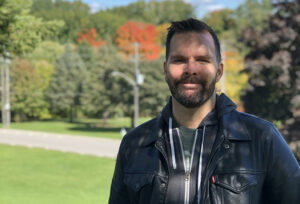Anishinabek Nation 2nd Annual Diabetes Conference to feature speaker Marc Hébert

By Rick Garrick
CHIPPEWAS OF RAMA FIRST NATION – The 2nd Annual Anishinabek Nation Diabetes Conference, Embracing Diabetes with Knowledge and Care, will take place on March 6-7 at Casino Rama in Chippewas of Rama First Nation. Featured will be a presentation on Working Together to Improve Kidney Care by Ontario Health (Ontario Renal Network)’s Marc Hébert, Indigenous Kidney Health Lead, and Mallika Patil, Indigenous Kidney Health Senior Specialist.
“We will be presenting at the conference about opportunities to prevent chronic kidney disease and dialysis,” shares Hébert. “Chronic kidney disease (CKD) is mainly caused by diabetes [and] hypertension, both things that we’ve known have disproportionately affected First Nations people, including those from Anishinabek Nation.”
Hébert says they also want to talk about the work they are doing in the communities, what is underway to enhance services and bring services to community in partnership with community, and how they can move forward on that in the future.
“I just wanted to share some good stories about some really positive things that are happening within Anishinabek Nation communities and look towards the future of how we could collaborate more to improve the way community services are delivered,” Hébert says.
He says a dialysis patient who had received a kidney transplant will be sharing some experiences about the research and advocacy work she has done as well as her own personal journey with kidney disease.
Hébert says the Ontario Renal Network collaborated with the community of Wiikwemkoong Unceded Territory during a pilot project in 2016 on implementing a screening program that tested about 500 people in the community for their blood sugars and heart function. Of those, about 25 people were identified as having a form of kidney disease, something they were previously unaware of. The individuals were then referred on and appropriately managed through the Wikwemikong Health Centre and Health Sciences North Sudbury’s renal program.
Hébert says that providing information about a person’s health status as well as working with a community to offer appropriate CKD care could help prevent someone’s need for dialysis in the future.
He adds that the Ontario Renal Network has expanded the program over the years to the northeast and southeast, including to the London, Barrie, Peterborough, and Hamilton renal programs.
“All of those renal programs have identified really strong connections with local First Nations,” Hébert says.
The conference will also feature presentations by Nicole Redvers, associate professor and director of Indigenous Planetary Health at the Schulich School of Medicine and Dentistry at Western University, who will speak about Bridging Indigenous Medicine Systems with Western Systems, and Nephi Craig, founder of the Native American Culinary Association, who will speak about Indigenous Foods for Health: Trauma, Violence and Sugar.


